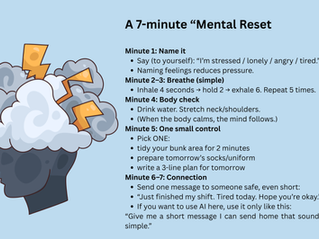Sleep Smart, Beat Tiredness on Long Voyages
- IMEQ CENTER

- Oct 20, 2025
- 3 min read
Life at sea isn’t easy on your sleep. Between long hours, shifting schedules, time zone changes, and the constant hum of the ship, getting proper rest can feel like an impossible mission. But here’s the truth — sleep isn’t just about feeling less tired. It’s about staying alert, safe, and mentally steady while you’re thousands of miles from shore.
This article dives into how fatigue quietly sneaks up on seafarers and what you can do to fight it — because managing your sleep smartly isn’t a luxury, it’s part of doing your job well.

When Fatigue Hits
We’ve all been there — that moment when your eyes start to blur during a watch, or you find yourself double-checking a reading you just took. That’s fatigue creeping in. It doesn’t always hit you like physical tiredness; sometimes it just dulls your focus and slows your reactions.
At sea, that’s dangerous. One small slip can risk lives, cargo, and the ship itself. And when tiredness becomes constant, it can lead to low mood, anxiety, and eventually burnout. So spotting the signs early and taking rest seriously is key — not just for your body, but for your mind too.
Sleep: Your Mental Reset Button
Sleep isn’t just about recharging muscles — it resets your head. A good sleep helps your brain organize memories, regulate emotions, and clear out stress. Without it, everything onboard — isolation, long shifts, or even small annoyances — feels heavier.
When work and rest start to blend together during long voyages, finding ways to protect your sleep is essential for staying balanced and sharp.
Smart Sleep Tips for Seafarers
1. Keep Your Cabin Sleep-Friendly
Even in a small cabin, you can set yourself up for better rest:
Use blackout curtains or an eye mask to keep it dark.
Keep the space cool and quiet — a fan or earplugs can help.
Skip coffee or heavy meals before sleeping.
Try a short “wind-down” ritual like stretching or deep breathing before bed.
2. Handle Shifts Smartly
Shift work messes with your body clock, but you can make it easier:
Stick to regular sleep times when you can, even off-duty.
Take short naps (20–30 minutes) to recharge without wrecking your sleep cycle.
Avoid scrolling through your phone before bed — bright screens trick your brain into thinking it’s daytime.
3. Use Light to Your Advantage
Sunlight is your natural body clock setter. Spend time on deck during the day to help your body stay in sync. At night, dim the lights and avoid phone screens so your brain knows it’s time to rest. If you’re sailing in areas with little daylight, a light therapy lamp can help.
4. Make Your Space Work for You
A comfortable environment makes a big difference.
Keep your cabin ventilated and minimize noise.
Use a good pillow or mattress topper — small upgrades can mean better sleep.
Tidy up before rest; a calm space helps your brain switch off.
5. Keep Stress in Check
Stress and sleep don’t mix well.
Try mindfulness, stretching, or journaling before bed to clear your head.
Talk to your crewmates — don’t let tension or misunderstandings build up.
Remember, a calm mind sleeps better.
6. Eat and Drink Smart
Your diet affects how well you rest.
Avoid heavy, oily, or spicy food right before sleep — go for lighter snacks like fruit or yogurt.
Stay hydrated, but don’t overdo it right before bed.
Choose slow-energy foods like nuts, grains, and vegetables to keep your energy steady.
Save caffeine for the first half of your shift — it stays in your system for hours.
Staying Alert as a Team
Good sleep habits work best when everyone’s on board (literally).
Fatigue Risk Management: Companies should watch shift patterns and make sure crew members aren’t overloaded.
Look Out for Each Other: If someone looks wiped out, step in. Fatigue is a shared risk.
Leaders Set the Tone: When officers and captains prioritize rest, it shows the whole crew that sleep matters.
The Payoff: Sharper Minds, Stronger Crews
When you start managing sleep smartly, you’ll notice more than just extra energy. You’ll think clearer, handle stress better, and get along more easily with the people you live and work with. Better sleep builds stronger teams and a safer ship — it’s that simple.
Final Thought
Fatigue will always be part of life at sea — but how you handle it makes all the difference. Treat sleep like one of your most important safety tools. Taking care of your rest means taking care of your focus, your mood, and your crew. Remember: true strength isn’t about pushing through exhaustion — it’s about knowing when to recharge.





































































































I was diagnosed with Parkinson’s disease four years ago. For over two years, I relied on Levodopa and several other medications, but unfortunately, the symptoms kept getting worse. The tremors became more noticeable, and my balance and mobility started to decline quickly. Last year, out of desperation and hope, I decided to try a herbal treatment program from NaturePath Herbal Clinic.Honestly, I was skeptical at first, but within a few months of starting the treatment, I began to notice real changes. My movements became smoother, the tremors subsided, and I felt steadier on my feet. Incredibly, I also regained much of my energy and confidence. It’s been a life-changing experience I feel more like myself again, better than I’ve felt…